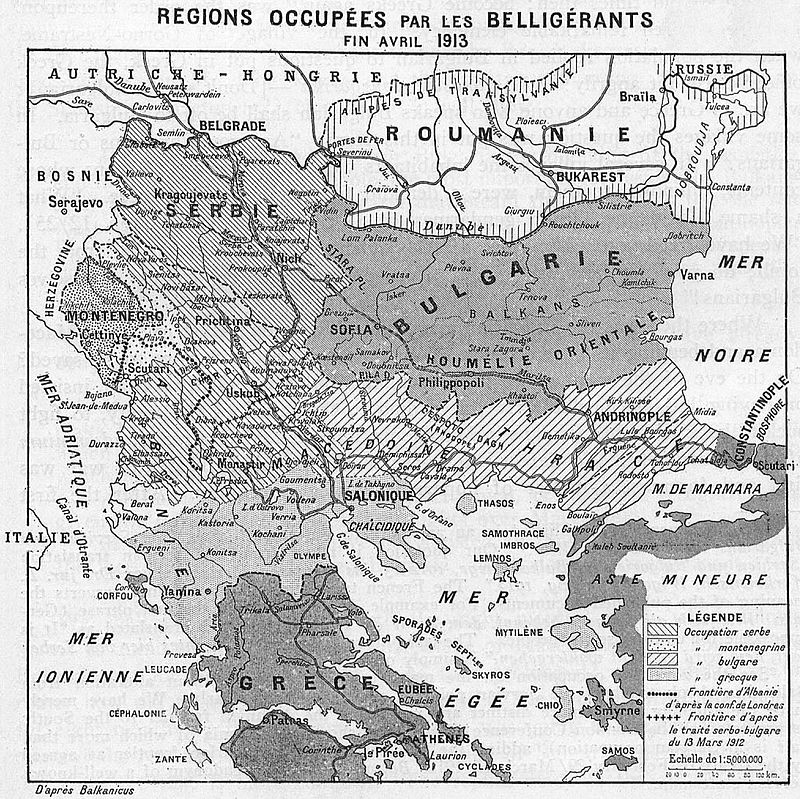For much of the 19th
century, the Great Powers of Europe had shared different aims over the
resolution of the Eastern Question. The Eastern
Question was the perceived dismantling and break-up of the Ottoman Empire of
the Turks. Each Great Power had their interests
and the region was ripe for conflict.
Russia wanted access
to the waters of the Mediterranean Sea via the Dardanelles. They also believed in the Pan-Slavic ideals of
unified Slavic peoples. As a
contingency, the Russians supported an expansion of the Greek nation in case the
integrity of the Ottoman Empire collapsed.
France wished to strengthen its position in the Levant, and was a
nominal ally of Russia.
Austria-Hungary
wished for the continuation of the Ottoman Empire. Both were troubled multi-national entities
and the collapse of the Ottoman’s would de-stabilize them as the various nationalistic
groups in her own borders would be agitated for their own homelands. The Ottoman’s were a counter-weight to the
nationalistic tendencies of her own people.
In this she was supported by the Germans who wished to make the Ottomans
an intact client state. Italy made no
real claims, but wished to keep the Adriatic clear of other state assets and was
part of the Triple Alliance with Germany and Austro-Hungary.
The Ottoman Turks
themselves wished to maintain the integrity of their nation. In fact, they had undergone a revolution in
1908 under the Young Turks and were on a reformist movement for the government,
army, and navy. This progress made the
Balkan people restive and a number of illicit organizations were formed with
Nationalistic intent.
After the fall of
the Young Turks with their defeat in the Italo-Turkish War, the rebellious Balkan
states formed the Balkan League to act against the Ottomans. If Turkey could bring in troops from Asia,
then the Balkans could not hope to win.
Therefore, the Balkan League had to rely on the support of some of the Great
Powers if they wished to be free. However,
the existence of the League proved to be a noisy political nuisance to all the
great powers. Only Russia secretly
approved and supported their efforts.
The Balkan League
was loosely aligned with the Russo-Frankish alliance, while the Ottomans were
aligned with the Triple Alliance. So the
groundwork for hostilities was laid, with the threat of a Great Power war
hanging in the balance.
 |
| Map of the actual First Balkan War |
The Balkan Uprisings will be a campaign using the
campaign rules found in the Castles in the Sky rulebook. This will be a
medium sized campaign of 75 Armor points per side. Each faction will be able to choose a percentage
of ships from the aligned Fleet Lists at the percentage indicated. The sides will be:
Balkan League Allies
Russia- Up to 60 Armor Points
France- Up to 20 Armor Points
Ottoman Allies
Ottoman Empire- Up to 35 Armor Points
Austro-Hungary- Up to 35 Armor Points
Italy- Up to 15 Armor Points
Each fleet must have at least 50% spent on Cruisers or
smaller and no more than 25% on battleships.
Each fleet will have 4 Strategic Assets. Here are my fleet selections....
Balkan League Forces- 74 Armor Points
Russians:
Poltava Captain: Pyotr Senyavin Command:
2 - Flagship
Class: Imperatrista Mariya Category: Battleship Armor: 8
Imperator Pyotr Captain:
Pavel Ivanov Command:
1
Class: Imperatrista Mariya Category: Battleship Armor:
8
Oleg Captain:
Aleksey Rozhestvensky Command:
2
Class: Bogatyr Category:
Cruiser Armor:
7
Rurik Captain:
Nikolai Ushakov Command: 1
Class: Azova Category:
Cruiser Armor:
7
Vityaz Captain:
Georgy Vysotskiy Command: 2
Class: Bogatyr Category:
Cruiser Armor:
7
Pallada Captain:
Matija Yumashez Command: 1
Class: Bayan Category:
Cruiser Armor:
7
Albatros Captain:
Feliks Golokov Command: 3
Class: Krasnoye Category:
Gunboat Armor: 5
Kondor Captain: Nikolay Konovalov Command: 3
Class: Krasnoye Category:
Gunboat Armor: 5
Sova Captain: Vladimir Greig Command: 1
Class: Krasnoye Category:
Gunboat Armor: 5
French:
Brennus Captain: Theo Aube Command: 4
Class: Charles Martel Category:
Heavy Cruiser Armor:
8
Primauguet Captain: Jean de
Vienne Command:
4
Class: D’iberville Category:
Cruiser Armor:
7
Ottoman Alliance- 73 Armor Points
Ottoman Empire:
Sultan Mehmed II- Fatih Captain: Seydi Al Reis Command: 3- Flagship
Class: Sultan Osman-I Evvel Category:
Battleship Armor: 9
Basra Captain:
Hasan Rami Pasha Command: 2
Class: Barbarous Heyreddin Category: Heavy Cruiser Armor: 8
Mecidiye Captain:
Medvid Reis Command:
1
Class: Hamidiye Category:
Cruiser Armor: 8
Trakya Captain: Piri Pasha Command:
2
Class: Midilli Category:
Light Cruiser Armor:
7
Barbaros Captain: Murat Pasha Command:
2
Class: Berk Efsan Category: Torpedo Boat Armor: 4
Austro-Hungarians:
Prince Eugen Captain:
Anton von Sterneck Command:
2
Class: Tegethoff Category:
Battleship Armor:
9
Sankt Georg Captain: Rudulf Horthy Command: 4
Class: Kaiserin Category:
Armored Cruiser Armor: 8
Bravo Captain: Anton Pock Command:
4
Class: Huszar Category:
Destroyer Armor:
6
Volta Captain: Ludwig Brommy Command:
1
Class: Huszar Category:
Destroyer Armor:
6
Italians:
San Bartolomeo Captain:
Paolo Revel Command:
1
Class: Vettor Pisani Category: Armored Cruiser Armor:
8
The Balkan League is attempting to assist the Balkan
forces in driving the Ottoman’s out of Europe.
Meanwhile, the Ottoman Alliance is attempting to maintain possession of
European territory and support and protect the ferrying of troops from the Asian
part of the Empire across to the European part of the Empire.
The campaign will last until one side reaches 7 Campaign
Points with a victory margin of 2 points.
The winner of a scenario earns 1 campaign point. If they inflict twice
as much Armor loss then they gain 2 campaign points, and if the difference is 3
times they score 3 points.
The normal rules for Campaigns found in the Castles in the Sky rules will be
used. Like my last battle report, I will be using templates from my Aquanautica Imperialis rules for my ships along with Aeronautica Imperialis bases to keep track of altitude and speed.
I plan on starting this campaign by the end of January. Stay tuned.

No comments:
Post a Comment